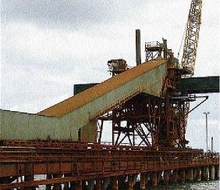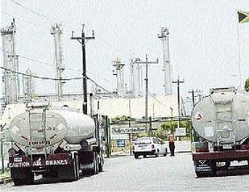Lower oil bill, better BOP results - But reserves still under pressure
Published: Friday | November 6, 2009


Left: Bauxite pier in Discovery Bay, St Ann. Bauxite and alumina export volumes were down 45 per cent in the first half of 2009. Right: Oil tankers heading towards the Petrojam Refinery in Kingston in August 2006. Jamaica's imports of mineral fuels fell by US$$1.3 billion between January and June, contributing to improvements in the current account deficit. - File
JAMAICA HAS sliced US$1.34 billion off its fuel bill in the first half of this year, due, in part, to the scaling back of some industry activity, particularly bauxite, but also because of decidedly lower world crude prices that are now hovering at US$80 per barrel.
Between January and June, the country spent US$598.5 million on mineral fuels, compared to US$1.9 billion in the same period last year, when oil prices peaked on the world market at US$147 per barrel, providing relief to Jamaica's stressed coffers.
The country's current account deficit has also been reigned in from US$1.37 billion at HY2008 to a deficit of just US$198 million in the current period - a US$1.76 million improvement.
But fundamental problems remain.
For the month of June itself, when the deficit was brought down from US$280 million to US$16, the Bank of Jamaica (BOJ) said in its preliminary review of balance of payments that foreign exchange flows from official and private sources were insufficient to finance the current account deficit, requiring a draw down of reserves.
"Consequently, the NIR (net international reserves) declined by US$52.4 million during the month," said the June 2009 report. For the half-year, the decline amounted to US$153.6 million.
Imports fell, by about 50 per cent, from US$4 billion to US$2 billion, but so did exports from US$1.6 billion to US$702 million, reversing a recent trend in the upward movement in cross-border trade as the recession deepens.
Greatest cut for crude
Crude materials had the heaviest fall, tanking by more than US$512 million or 68 per cent to US$242 million as bauxite and alumina companies wait out the downturn in the aluminium markets.
Jamaica shipped 1.29 million tonnes of bauxite and 1.06 million tonnes of alumina, compared to last year's 2.26 tonnes of bauxite and 2.02 million tonnes of alumina, averaging a 45 per cent decline across the two products.
The bauxite/alumina sector consumes more than nine million barrels of crude annually, a third of the more than 27 million barrels used across all sectors of the economy.
Consumption figures for 2009 are not yet available, but the sector is likely to have reduced its usage given that some plants were shuttered earlier this year, including the UC Rusal-owned operations which command more than 50 per cent of Jamaica's bauxite assets.
Income from bauxite/alumina sales fared much worse than the fall in export volumes, falling 70 per cent for the more lucrative alumina exports, from US$677 million to US$200 million, reflecting the softening of the world aluminium market.
Fewer remittances
Crude bauxite export earnings dropped from US$59 million to US$35 million this period.
Foreign companies here also remitted fewer profits to their home country, resulting in a US$19-million improvement on the income sub-account.
Services fared even better, growing by US$190 million to US$480 million, "primarily resulting from a decline in freight costs associated with reduced imports," said the BOJ.
Jamaica's ports have seen a significant reduction in business, stripping just 2.6 million tons of cargo at September, compared to about 3.6 million tons in the same nine-month period of 2008.
The positive results on the services account, however, were partially offset by a reduction in estimated tourist spend, the central bank said.
Travel receipts fell marginally by US$29 million to US$1.03 billion.
lavern.clarke@gleanerjm.com

















